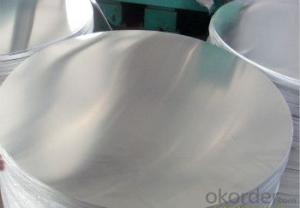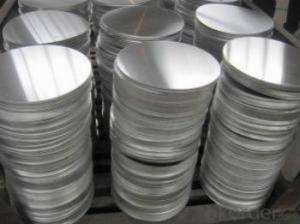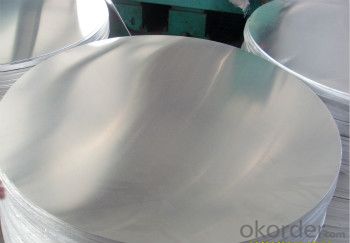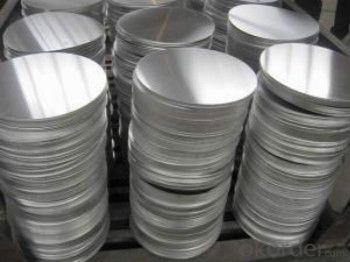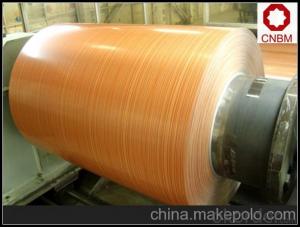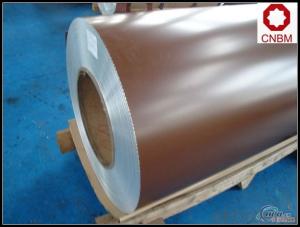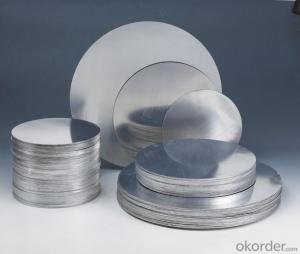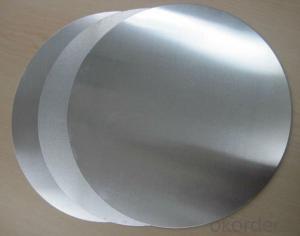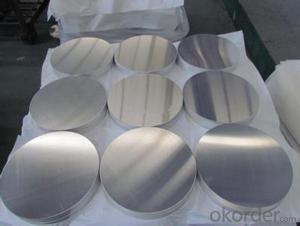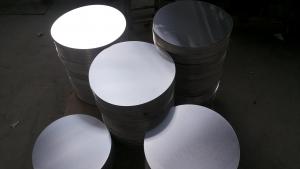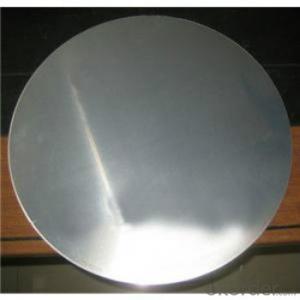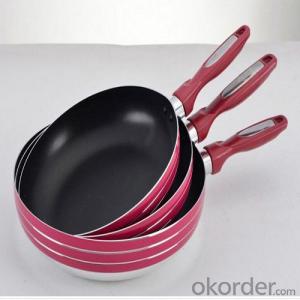Rolled Aluminum Coil for Spinning Aluminum Circles in Pots Manufacture
- Loading Port:
- Shanghai
- Payment Terms:
- TT OR LC
- Min Order Qty:
- 2 m.t.
- Supply Capability:
- 2000 m.t./month
OKorder Service Pledge
OKorder Financial Service
You Might Also Like
Specification
1. Structure of CC Aluminium in Coil Form for making Aluminium Circle Description
CC Aluminium in Coil Form for making Aluminium Circle is one semi-finished aluminium material. This coil can be rolled down to aluminium coil,sheet,circle ect. The alloy AA1050 is widly used in building, industry ect. Its weight is much lower than steel. So many customers choosed aluminium material instead of steel.
2. Feature of CC Aluminium in Coil Form for making Aluminium Circle
Surfact Quality :
Be free from Oil Stain, Dent, Inclusion, Scratches, Stain, Oxide Dicoloration, Breaks, Corrosion, Roll Marks, Dirt Streaks and other defect which will interfere with use,
Mechenical Property:
Chemical Composite and Mechanical Property
3. Image of CC Aluminium in Coil Form for making Aluminium Circle
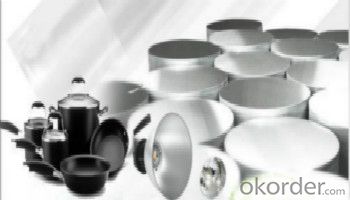
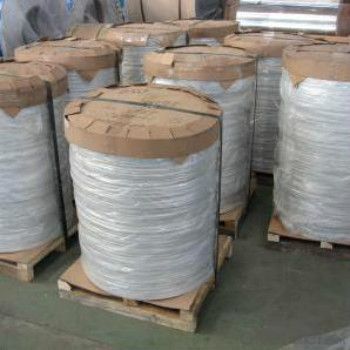
4. Specification of CC Aluminium in Coil Form for making Aluminium Circle
Aluminum Coil/Sheet | |
Main Specification | |
Alloy | AA1xxx (AA1050, AA1060, AA1070, AA1100 etc.) |
AA3xxx (AA3003, AA3004, AA3005, AA3105 etc.) | |
AA5xxx, AA6XXX (AA5052,AA5083, AA5754, AA6061, AA6062 etc.) | |
AA8xxx(AA8011, AA8006 etc.) | |
Temper | H14,H16, H18, H22, H24, H26, H32,O/F, T4, T6, T651 |
Thickmess | 0.01mm-100mm |
Width | 30mm-1700mm |
Standard | GB/T 3880-2006/ASTM |
Special specification is available on customer's requirement | |
5. FAQ
1) What is the delivery time?
Depends on actual order, around 20 to 35 days
2) What is the QC system:
We have QC staff of 20 persons and advanced equipment, each production is with MTC traced from Aluminum ingot lot.
3) What market do you mainly sell to?
Australia, America, Asia, Middle East, Western Europe, Africa etc
4)What about payment term?
30% T/T in advance, balance against B/L COPY.
- Q: What role does the powdered aluminum play in this reaction?
- Powdered Aluminum
- Q: The temperature of the water drops from 93.0°C to 78.0°C. What quantity of heat energy did the piece of aluminum absorb?
- The specific heat of Aluminum is 0.215 cal/g-°C. The calories absorbed (q) would be q = m * c * (T2 -T1) = 22.0 g * 0.215 cal/g-°C * (78.0 °C - 0.3 °C) If you have a different value for the Specific heat of Aluminum, use it in the formula for your calculations. If you knew the mass of the water, you could check your calculations because the heat gained by the Al would be equal to the heat lost by the water, using q = m * c * (T2 -T1), where m is the mass of the water, c = 1.00 calorie/gram °C, T2 = 78.0 °C and T1 = 93.0 °C. The sign of q will be negative.
- Q: I know aluminum has 3 valence electrons and oxygen has 7, but if anyone could explain the chemical formula to me it would be great.
- You are right about aluminum having 3 valence electrons, but oxygen has 6. Oxygen wants two more to get to 8. So the ions are Al +3 and O-2. The formula is Al2O3
- Q: What is the reason for the grooves that go around the circumference of a tin/aluminium can? It can't be for grip because they're covered with paper anyway and i don't think it would make much difference.
- To allow for expansion and contraction when temperature varies. (Strength would be from Vertical grooves). (Thanks (Ω)Jack).
- Q: How are aluminum coils used in the production of HVAC ductwork?
- The production of HVAC ductwork heavily relies on the utilization of aluminum coils. These coils are crafted from top-notch aluminum material that possesses qualities such as being lightweight, long-lasting, and resistant to corrosion, thus making them the perfect choice for HVAC systems. To commence the process of incorporating aluminum coils into HVAC ductwork production, the first step involves manufacturing. Initially, the coils are rolled into thin sheets, which are then precisely cut into specific widths and lengths that match the size requirements of the ductwork. This adaptability in sizing allows for the creation of customized ductwork that fits flawlessly into various HVAC systems. Once the aluminum coils have been cut to the desired dimensions, they are then fashioned into the shape of the ductwork. This can be achieved through a variety of methods, including bending, folding, or rolling, depending on the design and specifications of the ductwork. One of the notable advantages of employing aluminum coils in HVAC ductwork production is their superb thermal conductivity. Aluminum boasts exceptional heat-conducting properties, which means it can effectively transfer heat or cold air throughout the HVAC system. This characteristic is crucial for the proper functionality of the ductwork, as it ensures the desired temperature is maintained in different areas of a building. Furthermore, aluminum coils are renowned for their resistance to corrosion, which is of utmost importance in HVAC systems. The coils are exposed to various elements, such as moisture, which can lead to rust and deterioration in other materials. However, aluminum naturally forms a protective oxide layer that prevents corrosion, guaranteeing the longevity and dependability of the HVAC ductwork. Additionally, the lightweight nature of aluminum coils makes them simple to handle and install. This decreases the labor and time required for ductwork installation, resulting in cost savings for both manufacturers and installation teams. Moreover, the lightweight nature of aluminum coils reduces the overall weight of the HVAC system, making it more energy-efficient and alleviating strain on other components. In conclusion, aluminum coils serve as an integral component in the production of HVAC ductwork. Their lightweight, durable, and corrosion-resistant properties, combined with exceptional thermal conductivity, render them ideal for efficiently circulating air throughout the HVAC system. Furthermore, their flexibility in sizing and ease of installation contribute to their widespread utilization in the HVAC industry.
- Q: This question asks for the method to calculate the weight of an aluminum coil given its size.
- <p>To calculate the weight of an aluminum coil, you need to know its dimensions and the density of aluminum. The formula to calculate the weight is: Weight = Volume 脳 Density. First, determine the volume of the coil by multiplying its length (L), width (W), and thickness (T): Volume = L 脳 W 脳 T. The density of aluminum is approximately 2.7 grams per cubic centimeter (g/cm鲁). Convert the volume to cubic centimeters if it's not already. Then, multiply the volume by the density to get the weight in grams. To convert grams to kilograms, divide by 1000. This will give you the weight of the aluminum coil.</p>
- Q: How do aluminum coils contribute to LEED certification requirements?
- There are several ways in which LEED certification requirements can be met through the use of aluminum coils. Firstly, aluminum is an incredibly sustainable material due to its 100% recyclability without any loss of quality. This means that the inclusion of aluminum coils in construction projects can contribute to LEED credits for materials and resources, specifically in the category of recycled content. Furthermore, aluminum coils possess energy efficiency properties. Being a lightweight material, aluminum requires less energy for transportation and installation compared to heavier alternatives. Additionally, aluminum coils exhibit excellent thermal conductivity, enabling efficient heat transfer and reducing energy consumption for heating and cooling systems. These energy-saving advantages can lead to LEED credits in the categories of energy and atmosphere. Moreover, aluminum coils offer a long lifespan and require minimal maintenance. This durability minimizes the need for frequent replacements and reduces waste generation. LEED acknowledges the use of durable materials that promote longevity and lessen the environmental impact caused by constant replacements. Therefore, the incorporation of aluminum coils into construction projects can aid in earning LEED credits for sustainable sites and materials and resources. In conclusion, aluminum coils play a significant role in meeting LEED certification requirements by providing high levels of recyclability, energy efficiency, and durability. The utilization of aluminum coils in construction projects can assist in achieving LEED credits across various categories, ultimately promoting sustainable and environmentally-friendly building practices.
- Q: Besides replacing all the aluminum wiring.
- use the correct UL approved fitting/fixtures and the Aluminum based compound in every connection.
- Q: I was wandering, if your spear's shaft is made of aluminum, does that have any strength to it, i mean, say you had to block with the shaft, would a weapon break through like your basic sword or basic axe, i don't mean big heavy swords and axes, but like average ones, could it break through an aluminum shaft of a spear?
- How thick is the shaft? Even if it is solid, if it is fairly thin in order to be light weight like competition weapons I would not bet my life on blocking with something like that. If your shaft is solid and maybe one to 1 1/2 inches thick then maybe. A weapon does not have to be heavy to be powerful. If the practitioner is strong and fast he can generate quite a bit of power even with a lighter weight weapon. A bokken is not very heavy at all but in the hands of a skilled practitioner it can generate enough force to kill. The effectiveness of a weapon is in the technique not the weight. So don't underestimate a weapon and let weight fool you.
- Q: Aluminum is soft, so I have a roll coating, the material is very soft, 0.7*970, into 2100, it can be processed
- The pipe welding steel pipe seamless steel pipeThe billet slab billet billetThe iron alloy: ferrosilicon manganese Fe-V iron titanium iron chromiumAll other metal products: steel sheet other
Send your message to us
Rolled Aluminum Coil for Spinning Aluminum Circles in Pots Manufacture
- Loading Port:
- Shanghai
- Payment Terms:
- TT OR LC
- Min Order Qty:
- 2 m.t.
- Supply Capability:
- 2000 m.t./month
OKorder Service Pledge
OKorder Financial Service
Similar products
Hot products
Hot Searches
Related keywords
